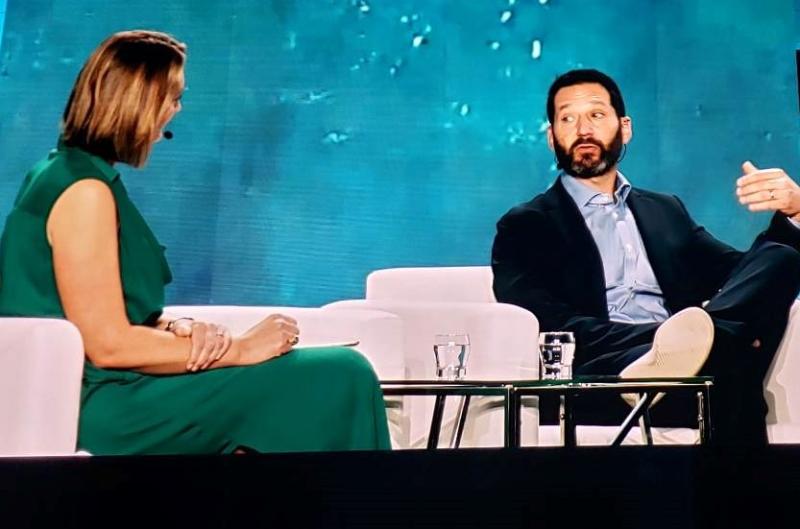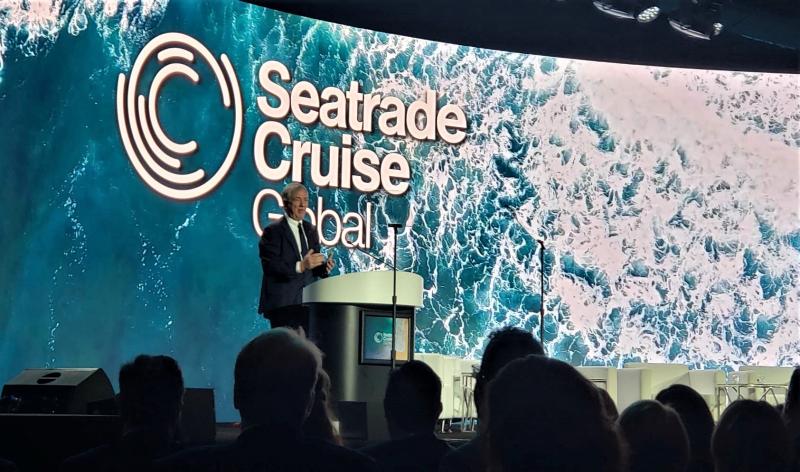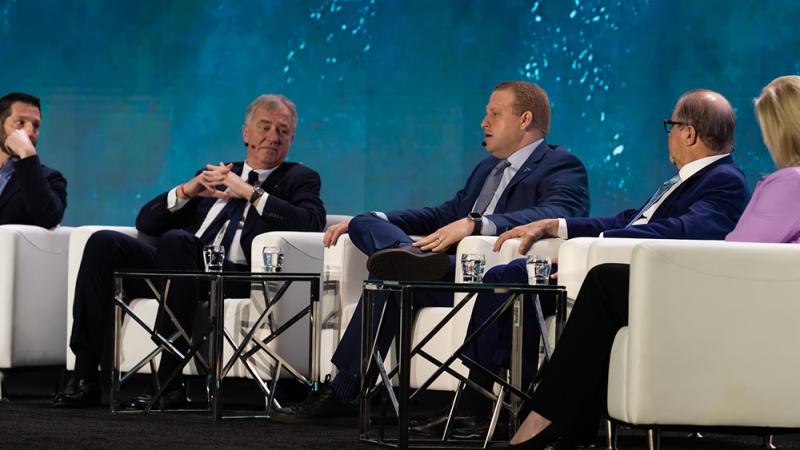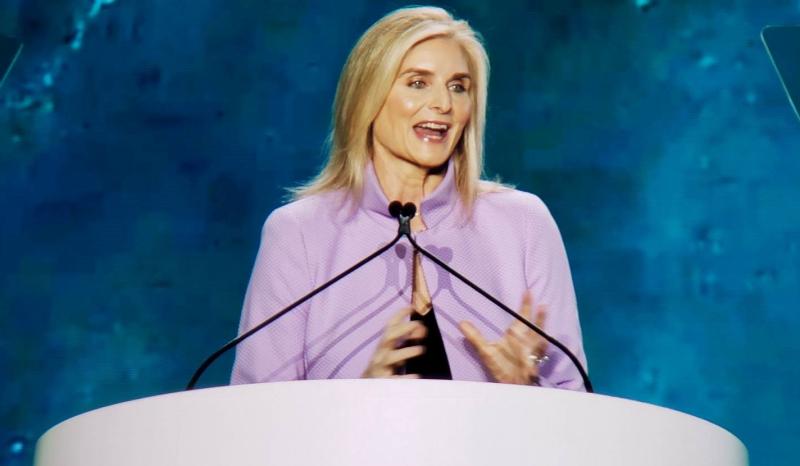In 2023, cruise tourism is forecast to reach 106 percent of 2019 levels, or 31.5 million passengers, according to Cruise Lines International Association’s (CLIA) “2023 State of the Cruise Industry” report. Most notable is that the number of consumers who say they "intend to cruise" is higher than it was in December 2019. That's a positive cruise industry trend that began in the last quarter of 2020.
CLIA research also revealed that 85 percent of past cruise guests plan to cruise again—6 percent higher than pre-pandemic. More than 10,000 people heard about these and other cruise industry developments at the 2023 Seatrade Cruise Global conference this week. It's unfolding at the Greater Fort Lauderdale/Broward County Convention Center adjacent to Port Everglades, FL.
2023 State of the Industry
“It’s incredible to me that given everything the world has been through…the 'intent to cruise' is higher than it was before the pandemic,” Lucy Hockings, news presenter and anchor, BBC World News, told the Seatrade audience attending the 2023 “State of the Global Cruise Industry” general session. "I just think that says something critical about your industry.”
Hockings then moderated an executive leadership discussion with these participants: Kelly Craighead, CLIA’s president and CEO; Josh Weinstein, president, CEO and chief climate officer, Carnival Corporation; Jason Liberty, president and CEO, Royal Caribbean Group; Frank Del Rio, president and CEO, Norwegian Cruise Line Holdings (NCLH), and Pierfrancesco Vago, executive chairman, cruise division, MSC Group. Vago is also currently CLIA's global chair.
The Next Chapter
Hockings asked NCLH's Del Rio about his recent decision to retire. “Look, I’ve been doing this for 30 years and we just came off a very difficult period,” Del Rio said. “I’m glad that the company/the industry is back to where we were prior to 2019. I think it’s the appropriate time for me to step down now. I’m weeks away from my 69th birthday and that’s enough.”
Del Rio said the industry is ready for a positive period ahead. “We were talking back-stage about how we’ve all come back out of this terrible two-year period, how excited we are—new vessels coming online, great demand—so, the future is bright and I’ll be cheering from the sidelines," he added.
Less than a year ago, Weinstein took over Carnival Corporation's helm as Arnold Donald shifted to the company's vice chairman role. Asked by Hockings what was the most rewarding part of his first year, he responded this way: "We completed the world’s largest start-up in history as far as we’re concerned,” referring to the company and industry being at a total stoppage during the pandemic, and then bringing ships back.

Weinstein indicated that his company has turned the corner and is now focusing on “How do we get this company back to strong profitability?” He said that’s really just drawing on the creativity, ingenuity, resourcefulness and resilience built in during the pause and putting it back into the business in a positive way. "And it’s once again focusing on the guest—focusing on the experience of cruising," Weinstein noted.
He continued: "It's all about making an amazing holiday for our guests and their loved ones and we do it really well. That’s why the demand is what it is. That’s why we’re able to deliver day in and day out and make people happy and come back. We’re in a good place.”
Liberty, who became Royal Caribbean Group's CEO in early 2022 as Richard Fain stepped down (and remains chairman of the board), was asked about his biggest success thus far. First, he said was the chance once again to see guests and crew smile, and second, "it’s so great to be making money. It’s been an incredibly journey—last year to ‘stand up’ our entire fleet, to get our occupancy up to where we’re starting to make money again, which was really a huge feat. And, this year, just watching the acceleration and…getting our business back up to normal.”
From an industry perspective, “we have taken everything that the world has thrown at us in stride and turned it around," Liberty said, crediting the industry's resilience. He said that in any given year, there's always something. "Some years it’s bigger than others, he noted. "I get that. But I don’t think anybody ever lost hope or lost the belief that ultimately we would see our way through this with not just ourselves but with our partners around the world.”
One positive outcome is that during the pause, partners such as countries and destinations “saw the value of cruising, saw the economic and social benefit that we can bring to communities around the world," Liberty stressed. Without cruising, "it's a pretty big hole,” he said, and that’s helped the global cruise community and its partners really understand the importance of those deep relationships.
Diversity in Leadership
CLIA's Craighead was asked about about the growing number of women in leadership roles within the cruise industry. "Cruise certainly leads in maritime when it comes to the number of women who are involved," she said. One factoid she loves? “There are more female captains by percentage of ships than there are of airplanes," she said.
In addition, she pointed out the progression of capable women into leadership roles at cruise companies, but said it also wasn’t simply in the boardroom or the executive room "It's throughout the entire ranks," said Craighead. "To me, the energy is palpable…there is just exciting new leadership at all levels.”
Sustainability and Eco-Protection
Much discussion during the "State of the Global Cruise Industry" involved the topic of sustainability. MSC Group's Pierfrancesco Vago, who also serves as a global chairman of CLIA, gave an individual presentation to the Seatrade audience about that topic. The cruise industry has a goal of getting to net-zero emissions by 2050. Such efforts as building LNG ships and plugging into shoreside power are among the steps it's taking.
During the panel discussion that followed, he said: “Obviously, we’re talking about sustainability. This is our next task. And we’re trying to do it in so many ways. We are building beautiful ships. There is a lot of technological improvements that apply to our ships."

But cruise ship hardware and technology aside, the world has to develop next-generation fuels and solutions to continue that journey. "We can only get to a certain level of improving our emissions and the impact to the environment." Vago stressed. Given the current technology and fuels, the cruise industry can only get to 70 percent of its final goal. While that's great progress from five or seven years ago, he explained that the remaining enhancements must come from new fuels.
“We’re doing our part,” Vago said, although not a lot of people know about it, so “now we’re doing the storytelling. But we can only reach a certain level" with what's currently available.
Hockings asked about the frustration that’s developing as the fuels needed to reach the level the industry wants just aren’t there. “Obviously, it’s a journey," said Vago. He sees a hybrid solution that's a mix of new technologies, fuel cells, new fuels, biofuels, but until there is a solution, "we'll never be completely net-zero."
Industry Collaboration
Would more collaboration help? Liberty said the industry already talks both among cruise companies and across the greater maritime industry, although "there can always be more." He sees two prime benefits of that: "Not only is it the right thing to do for the planet, but it also lowers our fuel bill. We need to have our ships prepared to take on the alternative energy as it becomes available."
Yet, Liberty also said that's focused on the advancement of the technology but also “what is that alternative fuel going to be that’s going to be available, and scalable and affordable for our ships around the world. We continue to chip away, which we do each and every day on trying to reduce the amount of carbon we’re emitting."
Right now, ships are plugging into shore power at ports, but that source of shore power must also be clean energy, "which today is not overly available," he added. "And it involves preparing ships—both new technology and hardware on new ships and retrofits on older ships. "It's broader than cruise," though, he said. "This all needs to be addressed by maritime because cruise is actually quite small in the grand scheme of things."

Weinstein agreed, noting that the sustainability is one area in which "we can pool the resources to have our voices heard." But he also stressed that "until we have a bit more clarity, it’s going to be difficult to satisfy people
Consumers ask all the time, said Weinstein, "'Are you going to get to net-zero?" The answer his company offers is "yep." Then people ask, "Do you know how you're going to get there." The answer, he said, is "nope."
"We don’t because it doesn’t exist yet," he explains. The best thing we can do is plan to collaborate, keep chipping away." But, he says, every single year the cruise companies are all making improvements in what cruise ships are emitting.
What About the Customer?
Sustainability consumed a large part of the "State of the Global Cruise Industry" panel discussion. Del Rio said he concurred with all said on the sustainability front from other leaders, but also this: "I think the industry spends way too much time on something that we don’t know much about."
He continued: "We will do whatever the science and the technology allows us to do. We’re not laboratories. We’re not scientists. So we have to depend on others. We talk to others. We want to support others. But I’m not sure we’ll hit net-zero in 2050, 2030, 2093. I don’t know." Yes, he said, the cruise industry must be part of the narrative, but he bluntly stated: "So far. we’ve been here an hour and no one has talked about the 'c' word—the customer."
"I know that the purpose of the cruise industry is to provide great vacations for customers and I don’t think we talk enough about it because we’ve been carried away by this narrative about sustainability and renewables and...everything else," he stressed. "I think it’s time to be more balanced. Let’s not forget about fuels, but let’s not forget what the real purpose of our business is."
Hockings then alluded to Millennial trends, noting that those younger customers really do seem to care about the issue. "Everybody cares to some degree,” Del Rio says, but “will they pay for it?"
Cruise Pricing Lags Compared to Land
Del Rio then talked about one of the cruise industry's challenges: Pricing compared to land-based vacations is low—"too low." He added: "Over the past three years, that gap has actually increased. Try to book a hotel room in Europe. Try to go to a nice restaurant in Buenos Aires. Try to get an airplane ticket somewhere. And we’re lagging behind."
One reason for that? He wonders if the industry hasn't focused enough on the product that the lines are delivering. "People will pay for whatever it is that is valuable to them," he stressed. "But it seems that the cruise industry has not kept up with what consumers want because the land-based vacations are eating our lunch in terms of pricing. We have to do better there.”
Weinstein agreed with Del Rio "in that we use the statistic of 25 to 50 percent cheaper than a land-based vacation." He believes that "we need to do a better job of communicating what the value proposition is of a cruise to people who don’t know cruising. We need to do a better job and we are working on that."

He also said that when it comes to sustainability and travelers, "if you think about your daily life, and the way you go about your daily life, it matters," but "it’s not as sharp as you might otherwise think." In other words, when talking about sustainability and vacations, "the research that we’ve seen is that people expect for us to be good," says Weinstein. "They expect for us to do good. But they’re not making their [vacation] decision based on that because they’re making an assumption. So, if we’re not good, we are going off the list. But if we’re seen as doing the right thing—if we’re satisfying the base line expectation—then they’ll come with us."
So, Weinstein said it was all about staying ahead of the customer expectation of being good and that he thinks everyone is doing that.
Storytelling Is Important
Vago said the sustainability discussion is "really about the storytelling, and sometimes the wider audience doesn’t really know what the industry has done in terms of technology and the environment." He thinks it's important to keep moving forward with that information. For example, he mentioned that some of his ships can emit a low frequency noise so the ship doesn't disturb mammals in the water. "It’s amazing.," he stressed. "Nobody is aware of it."
So, the storytelling about sustainability counts, he said. In addition, he noted the industry is also working to equitably distribute passengers when calling in large port cities, such as Barcelona. To avoid overcrowding in destinations, cruise ships can call based on a timetable, with only so many ships at once in port.
"We've done incredible things as an industry," Vago emphasized. "All I’m saying is that we should be proud of what what we’ve done so far. We've been to hell and back so many times—safety, security, the pandemic. We’ve done incredible things as an industry."
Right now, "obviously, we don’t have the magic wand," Vago acknowledged. "We won’t have the solution tomorrow morning [but] at least we are engaged."
Reaching the Goal
Summing up the sustainability messaging and the way to reach net-zero emissions by 2050, Craighead offered this about the discussion: "This is probably the best reflection of how technically perfect they all strive to be. There is a path to achieving these ambitious goals in 2050. We know it’s going to be a mix of operations."
She said individual lines will all make choices about their itineraries. Plus, "we know it’s going to include technology," Craighead said. "We know that it’s going to take infrastructure. So it really is going to be a mix of these things. What is the mix? What is the fuel? We do not know the exact specificity of each of those things. But we do know that there is a path to get there."
Travel Agent will be reporting more to come out of the Seatrade Cruise Global conference during the next few days. Stay tuned for more updates.
Related Stories
Holland America's Gus Antorcha on Cuisine, Alaska, Long Voyages
Disney Cruise Line to Homeport in Singapore from 2025
Emerald Cruises Unveils Themed Danube River Cruises
Swan Hellenic Announces Cultural Expedition Cruises for Africa